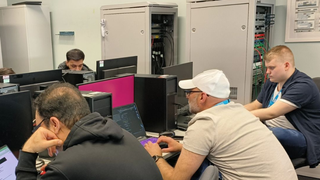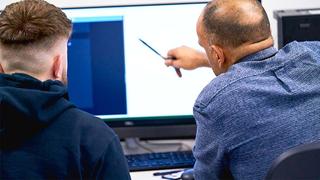Building a Career in Cybersecurity

Chris Miller, Computing tutor and Palo Alto Networks Instructor
As the world becomes more digital, cybercrime is rising fast. Global losses are expected to reach $23 trillion by 2027. In the UK, a major ransomware attack in 2024 on NHS provider Synnovis cost £32.7 million, exposed sensitive patient data, and disrupted thousands of operations.
At the same time, there’s a huge shortage of skilled cybersecurity experts. The world needs around 2.8 million more professionals. In the UK alone there are about 17,000 unfilled jobs in the sector. This gap is leaving businesses, governments, and vital services exposed to attack.
Threats like this highlight the global skills shortage for cyber security professionals and with both governments and the private sector affected by the shortage, and targets for cyber criminals, demand for highly skilled well trained staff is high.
So what’s needed to become a cyber security specialist or ethical hacker? Learn about our cybersecurity and computing higher education courses, and how they can help you enter an exciting career.
Why study cyber security?
Studying cybersecurity opens the door to one of the fastest-growing and most in-demand career paths in the world. With businesses, governments, and healthcare systems increasingly under attack, organisations urgently need professionals who can protect their data, systems, and people.
A qualification in cybersecurity equips you with the technical skills to combat threats like hacking and ransomware. It also gives you problem-solving, analytical, and ethical decision-making abilities that are valued across every industry. It’s a chance to build a career that’s future-proof, impactful, and directly contributes to keeping society safe in the digital age.
Skills needed for a career in cybersecurity
Computing
A strong foundation in computing is at the heart of every cybersecurity role.
Key abilities include:
- Understanding operating systems (Windows, Linux, macOS).
- Programming and scripting (e.g., Python, PowerShell, JavaScript).
- Building and managing computer networks.
- Using databases and cloud platforms securely.
- Troubleshooting systems and hardware.
How we prepare students: these skills are taught through a mix of theory and lab-based practice. Students graduate with both the knowledge and hands-on experience to operate confidently in professional environments.
Forensics
Cybersecurity professionals often need to investigate breaches and provide evidence in line with the law.
Key abilities include:
- Understanding computer misuse laws and digital evidence handling.
- Analysing hard drives, mobile devices, and network traffic.
- Identifying traces of malware or unauthorised access.
- Preserving chain of custody for legal investigations.
- Writing clear forensic reports.
How we prepare students: modules simulate real-world investigations, giving computing students the chance to apply forensic tools and techniques in controlled but realistic scenarios.
Hacking (Ethical Hacking)
Defending against hackers means learning to think like one.
Key abilities include:
- Penetration testing (probing systems for vulnerabilities).
- Understanding common exploits (SQL injection, phishing, buffer overflows).
- Bypassing authentication and access controls (ethically).
- Using tools like Wireshark, Metasploit, and Kali Linux.
- Designing security strategies to prevent attacks.
How we prepare students: students use industry-standard hacking tools in a supervised environment, developing practical skills to audit systems and build stronger defences.
Problem-Solving
Cybersecurity is rarely straightforward as attackers constantly find new ways in.
Key abilities include:
- Analysing incomplete or unclear information.
- Spotting patterns in data that reveal a threat.
- Applying creative thinking to close security gaps.
- Making fast decisions under pressure.
- Designing long-term solutions, not just quick fixes.
How we prepare students: UCEN Manchester encourages problem-solving through group projects and live case studies. Students work under pressure to respond to simulated cyber incidents.
Communication
A key part of cybersecurity is explaining risks and solutions to people who aren’t technical.
Key abilities include:
- Writing clear reports for managers or regulators.
- Presenting findings in plain language.
- Explaining risks without jargon.
- Collaborating with IT teams, management, and external partners.
- Negotiating solutions in high-pressure situations.
How we prepare students: at UCEN Manchester, students practice presenting and reporting in different formats. This ensures they can translate complex technical findings into clear, actionable insights.
Resilience & Adaptability
Cybersecurity is unpredictable, and professionals need to thrive in uncertainty.
Key abilities include:
- Staying calm under stress during a cyberattack.
- Quickly adapting to new threats or technologies.
- Learning continuously as the threat landscape evolves.
- Prioritising tasks when resources are limited.
- Bouncing back from setbacks or failed attempts.
How we prepare students: simulated “live fire” scenarios, teamwork challenges, and fast-changing problem sets that reflect the reality of modern cyber defence.
Learn more: 9 Jobs You Can Get with a Computer Science Degree
FAQs about studying Cybersecurity
1. Do I need to be “good at maths” to succeed in cybersecurity?
Not necessarily. While logical thinking and problem-solving are important, you don’t need to be a maths expert. UCEN Manchester’s courses start with the fundamentals and build your technical and analytical skills step by step, so you can progress confidently no matter your starting point.
2. Is cybersecurity only for people who want to work in IT?
No. Cybersecurity is about protecting people and organisations, so it requires a mix of technical skills, communication, and critical thinking. Many graduates go on to roles in law enforcement, compliance, business, or consultancy as well as IT-specific jobs.
3. Will I get hands-on experience, or is it mostly theory?
You’ll get plenty of practical experience. UCEN Manchester uses labs, simulations, and real-world case studies to ensure you don’t just learn concepts in the classroom. You apply them in environments that mirror what you’ll face in industry.
4. What career opportunities are there after this course?
Cybersecurity specialists are in huge demand. Career paths include ethical hacking, digital forensics, security analysis, compliance, risk management, and even specialist roles in government or policing. With a global skills shortage, graduates can expect strong job prospects and career progression.
5. What support is available if I struggle with the technical side?
UCEN Manchester has dedicated student support teams, tutors with industry experience, and access to extra workshops. Whether you need help with coding, report writing, or building confidence, support is built into your learning journey so you never feel left behind.
Study a cybersecurity course at UCEN Manchester
Take the first step towards an exciting and future-proof career in one of the world’s fastest-growing industries. At UCEN Manchester, you’ll gain the technical expertise, practical experience, and professional skills employers are looking for. All while learning in a supportive, hands-on environment. Whether your goal is ethical hacking, digital forensics, or protecting vital national services, our courses will prepare you to make an impact from day one.
Apply now for our FdSc or BSc (Hons) in Computing Network Security (Top-up) or explore our wider range of computing qualifications and enrol today.

